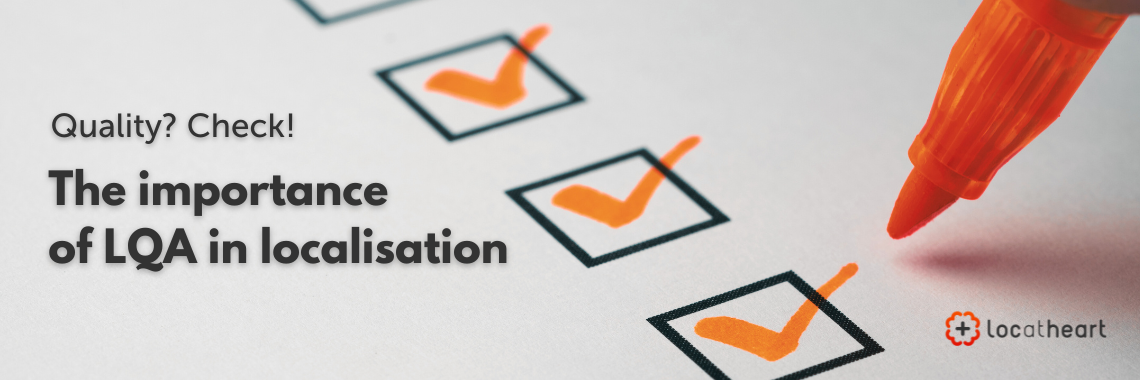Quality? Check! The importance of LQA in localisation
LQA – meaning language quality assurance – is an integral part of the process of localisation. Or at least it should be. It gives us an additional guarantee that the translated text is of the highest quality, done according to all provided guidelines, and that no mistakes have crept into it. But what does this process entail and how to implement it properly? You will find the answers to these questions in the article below!
The nature of LQA
Although it might sound surprising, simply translating content is rarely enough – translation is just the beginning part of the entire process of localisation. When done properly, this process also includes editing and proofreading the translated text (done by different people than the original translator). But there is also another step to be taken into consideration – LQA.
Language (or localisation, or linguistic) quality assurance is a process of evaluating the quality of a translated text and making sure it meets the requirements set out in corresponding guidelines, not only when it comes to linguistic nuances, but also in terms of layout and formatting. This step includes checking for spelling or grammar mistakes, ensuring the accuracy of style and meaning, verifying whether the terminology was used correctly and so on. It is usually the last stage in the entire localisation process, which is why it may be tempting to overlook its significance – but try to resist this temptation!
A brief history
Prior to the emergence of machine translation, human translators were at the forefront of the localisation industry. But of course “pobody’s nerfect”, and so even the most prominent translators can make a mistake sometimes, even if it’s such a minor (or so it would seem) thing as overlooking a wrongly placed comma or a spelling mistake – surely the majority of us were in a situation where we’ve read certain texts many times but missed even the most obvious errors!
This is where Localization QA comes into the picture. The objective of this stage is to make sure that the final version of a text – even though it has been reviewed by at least a couple of pairs of eyes – is absolutely spotless. It was useful then, and it maintained its importance when the localisation industry was modified by the introduction of machine translation.
So what of machine translation (MT)? At first, its quality was rather (or even extremely) poor and required post-editing, which is a combination of editing, proofreading and LQA performed by a human linguist. But machine translation has improved significantly since then, and the quality of its outcomes continues to get better. Does that mean that we can now safely disregard the quality assurance step?
Absolutely not!
The reality
Even if machine translations keep improving, it’s highly doubtful that they will ever reach perfection – and only then we could even begin to think about doing without the services of linguists. Until then, however, it’s best to include them in your projects.
The LQA process has many faces. It can be performed by a human linguist from start to finish, but there are tools which can help speed it up a little. Certain CAT (computer-assisted translation) tools include such an LQA feature; there are also programs dedicated specifically to this task. Among them we can list Xbench which gathers data from both source and target files, and then presents you with a list of every single inconsistency it was able to find. Of course, these are not in any way final changes – they should also be verified by a human linguist, who will decide which changes will improve the quality and which not.
There are also times when we are not able to verify the quality of the entire text (due to a lurking deadline or for any other reason). Then, we can ask for verification of particular abstracts, selected randomly or due to their importance. In such situations, linguists are able to determine whether the provided snippets are satisfactory – if they are, it is safe to assume that the rest of the text is also well-written. If not, it is advisable to perform LQA on the entirety.
We have to mention AI
Nowadays, AI is dominating many industries, and the localisation industry is one of them. Texts written by AI tools are pretty impressive, yet still a human touch is necessary to ensure their quality and – most importantly – correctness. Models such as ChatGPT create texts on the basis of data resources that were implemented into them. When given a topic to write an article about, they will generate a text response based on those resources. This could lead to so-called “hallucinations”, meaning that if the AI doesn’t know something for sure, it will make it up and present as a fact – we wrote about it in greater detail here.
This means two things. First, verification of automatically generated content is slowly but steadily becoming part of LQA. Second – language and accuracy verification by a living and breathing linguist is absolutely necessary if you care about the quality and correctness of your content.
Specificity of audiovisual, e-commerce and gaming sectors
As we mentioned at the beginning of this article, LQA is not only linguistic quality assurance, but also localisation quality assurance – this term is primarily related to the gaming, audiovisual and e-commerce industries, and it focuses on the following criteria:
All of them have one main goal – to ensure that the final version of a product is of the highest quality and well-tailored to the target audience. But there are certain characteristics that distinguish these three sectors.
Games are meant to entertain masses of people around the world. That means they often are constantly updated, as nobody wants to play the same game in the same version over and over again. Therefore, game developers often use an agile approach, and localisation has to step into the agile process – as games are constantly updated with new strings of content.
This poses risks, as this new content has to be consistent with previous texts, usually not in one, but in multiple languages. This is where LQA proves to be indispensable. At locatheart, we work with a team of excellent translators and reviewers who are experts in their fields and know the previously localised content by heart. Thanks to this, as well as to the implementation of glossaries and translation memories, we are able to monitor the quality of every single string, as well as its consistency with the rest of the text and compatibility with target markets. In the case of continuous localisation (as described in this section), rule of thumb is to perform an extensive LQA audit at least once every three months – although this still depends largely on the details of the cooperation.
Quality assurance in audiovisual translation includes linguistic and technical revisions. Linguistic revision focuses on mistakes such as grammar or mistranslations. The equally important technical revision includes making sure that subtitles and the film file are synchronised and everything is adjusted according to the relevant style guide.
Such a technical revision is often called “tech check”. With it, we ensure that every single subtitle meets all requirements and that there are no mistakes that might have been overlooked during previous localisation stages. Tech check conducted at our agency includes:
It’s a pretty toilsome step of the process, but also an extremely significant one – thanks to it we can be 100% sure that the subtitles we are sending back to our customers are exemplary.
Translating e-store content is no piece of cake. Everything has to be sewed up perfectly, including seemingly minor pieces of text, such as product descriptions, newsletter messages, etc. Oftentimes, when it comes to such big content, the localisation process will start with machine translation in order to streamline it. In such cases a good LQA is worth its weight in gold. Your website represents your company. It needs to be of the highest quality, as even minor mistakes can throw potential clients off, and we definitely don’t want that. Naturally, not everything can be done at once; thus, it’s important to draw up a hierarchy of content, from the most to the least important (plus, different types of text will be approached differently).
So… is it worth it?
Of course it is. People tend to underestimate the power of the written word, but the reality is that without it, most businesses would likely cease to function. At locatheart, we can show you the power of LQA, as we work with top translators and editors in countless markets. We will help you decide if your content requires LQA and whether it’s worth to perform such an audit in your situation. Just drop us a line!







Leave a Reply